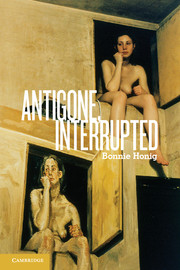Part II - Conspiracy
Published online by Cambridge University Press: 05 May 2013
Summary
Introduction to Part II
We saw in Chapter 2 that Diana Taylor was agnostic but not optimistic about whether a new or differently performed Antigone might avoid the Antigone-effect tracked in Part I. We might take Taylor’s conclusion – “we won’t have new answers until we have more choices” – as an invitation to pluralize Antigone, develop new readings, incite new performances. This will be the work of Part II. If we are going to endlessly reperform the gesture of turning to Antigone versus Oedipus (or even if we hope to break this perpetual cycle of reperformance), we need a different Antigone, one who does not just immerse us in a politics of lamentation premised on shared finitude but also inaugurates an insurgent politics of lamentation that solicits out of us a potentially shared natality.
Conspiracy is the theme that will help us to make this move. It comes from Walter Benjamin whose Origins of the German Tragic Drama (or Trauerspiel) (2003) picks up, as I have already intimated counterchronologically, where Fassbinder leaves off: with the mourning or martyr play that is melodrama’s low-culture cousin. Extending Benjamin’s own arguments, we saw in Chapter 3 how melodrama, modernity’s democratized Trauerspiel, might have potentially transformative or, at least, interruptive powers. But Benjamin offers us still more.
- Type
- Chapter
- Information
- Antigone, Interrupted , pp. 83 - 94Publisher: Cambridge University PressPrint publication year: 2013

